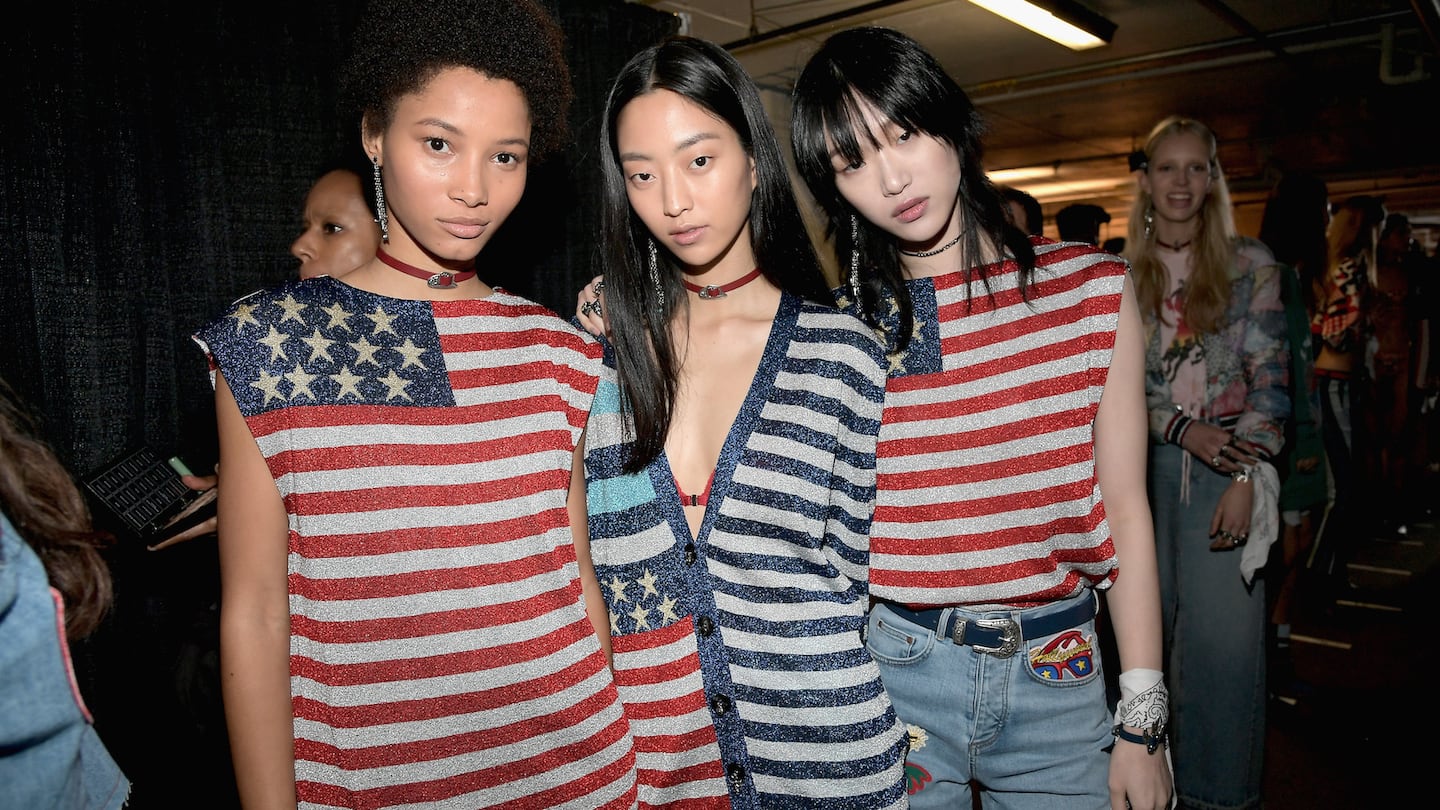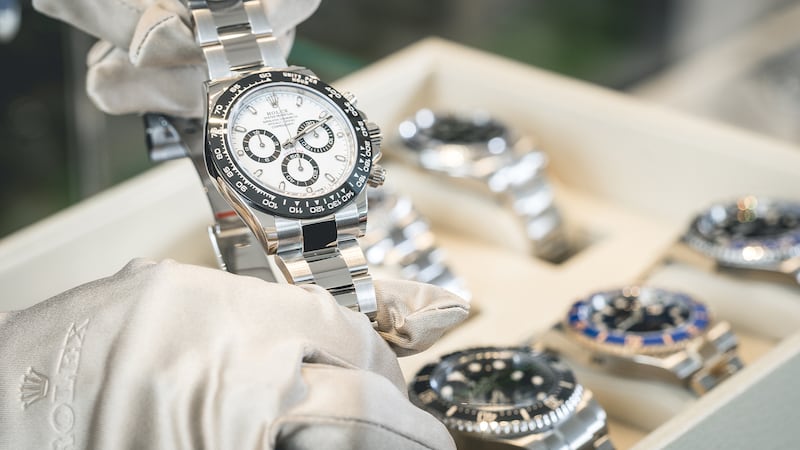
The Business of Fashion
Agenda-setting intelligence, analysis and advice for the global fashion community.

Agenda-setting intelligence, analysis and advice for the global fashion community.

On Wednesday, American fashion’s biggest trade groups announced their support for a contentious bid by Californian state legislators to make businesses publish their planet-warming emissions.
Many companies already report this information voluntarily, and disclosure will be mandatory for big companies operating in Europe from next year. But an increasingly polarised political landscape has made the topic a hot-button issue in America.
If the California bill passes, it would break new ground for environmental reporting requirements in the US. And while efforts to introduce similar requirements at a federal level are still in flux, California’s size and economic clout means its rules have a long reach.
US fashion’s support for the proposed legislation puts it ahead of many of the country’s other business sectors in pushing for progress on emissions disclosure. It’s certainly the latest sign that the industry is stepping up its lobbying efforts in an effort to influence an emerging suite of sustainability regulations.
ADVERTISEMENT
The proposed Climate Corporate Data Accountability Act, or SB 253, would require companies with more than $1 billion in revenue doing business in California to provide annual updates on greenhouse-gas emissions, not just across their own operations but in their supply chains where the vast majority of the industry’s environmental impact takes place.
If passed, companies would have to start reporting on their direct emissions by 2026 and on supply-chain emissions by 2027.
Europe’s already made moves in this direction, but California’s push could break new ground in the US. Efforts by the Securities and Exchange Commission to introduce similar requirements for public companies have faced significant opposition and could get watered down.
The Californian bill failed by one vote last year and corporate support for the measures has risen since then. But it still faces a fight to make it over the line in the next month, with opposition remaining from significant business lobbies in California.
Trade groups including the American Apparel & Footwear Association and the Council of Fashion Designers of America are backing the bill thanks to amendments made earlier this year to give companies more time before requirements to report on supply-chain emissions kick in.
The AAFA has previously expressed support for greater environmental disclosure, but pushed to slow the roll of regulation to give companies more time to gather the necessary data.
Despite the proliferation of climate commitments from fashion brands in recent years, plenty of large players still don’t report on their environmental footprint. And many companies will need to get a much better handle on where their clothes are made and where their materials come from in order to meet the proposed disclosure requirements.
“The industry knows climate change is an issue; there’s no one to sell clothes to if there’s not a planet to live on,” said AAFA sustainability director Chelsea Murtha. But getting every business across fashion’s supply chain to start gathering impact data is like “turning a cruise ship; it needs time to educate the industry,” she added.
ADVERTISEMENT
California’s economy is bigger than most nation states (if it were a country, it would rank in the world’s top five) so what happens in the state has a big influence.
And while incoming regulation in Europe means more fashion brands are going to have to provide information about their climate impact no matter what, if the California bill passes it would boost efforts to establish consistent environmental reporting standards. That would be an important development in itself, helping move corporate climate disclosures beyond the current era of voluntary reporting, which has resulted in a lot of information, but not much insight.
“We’re leaving the phase of the climate Tower of Babel,” said Steven Rothstein, managing director at the Ceres Accelerator for Sustainable Capital Markets, a nonprofit that has worked to build business support for California’s climate disclosure bill.
But better reporting by itself isn’t going to dent fashion’s sizable environmental footprint. To meet internationally agreed climate goals, companies need to drastically cut their emissions by 2030, which doesn’t leave much time if they’re only going to start reporting on their impact in 2027.
At the start of this year, the AAFA, CFDA and their partners published a manifesto to frame plans for more policy engagement around sustainability issues. New rules to help the industry operate in a more socially and environmentally responsible manner are welcome, it said, but they must be “practical, effective and workable.”
Better reporting will help push forward that agenda by providing truer insights and data to help shape smart regulation, said Murtha. “Disclosure gives us an entry point… that information will really drive policy.”
Critics worry it’s a framing that could be used to forestall swift action.
While the industry’s support for the Californian bill should be applauded, disclosure is just the first step, said Maxine Bédat, founder and director at fashion-focused think tank New Standard Institute and an architect of the New York Fashion Act, an ambitious regulatory proposal intended to make brands’ more accountable for what happens in their supply chains. “It cannot be used as political cover to say ‘we’re done here,” she said.
ADVERTISEMENT
The industry’s trade groups have yet to comment publicly on the proposed New York regulation.
The AAFA said it is paying particular attention to another regulatory push by California to make brands pay to clean up clothing waste. An initial proposal was withdrawn in July after the industry group and trade organisations called for more time to craft a robust policy.
“It just wasn’t ready,” said Murtha. “We need a lot more information to definitely know what is going to move the needle.”
THE NEWS IN BRIEF
FASHION, BUSINESS AND THE ECONOMY

Rolex to buy Bucherer in major retail move for Swiss giant. The acquisition paves the way for Rolex to begin widespread sales of its watches in its own stores. Bucherer has more than 100 stores worldwide and will continue to operate independently, keep its name and sell other watch brands. Financial terms from the merger weren’t disclosed.
Nike eyes record losing streak on China concern, inventory woes. The stock slid as much as 2.1 percent to $100.73, falling for a ninth straight session. The latest drop came after retailer and Nike customer Dick’s Sporting Goods Inc. reported disappointing fiscal second-quarter results and cut its profit outlook for the year due in part to more theft at its stores.
Abercrombie shares soar after boosting full-year outlook. The company’s shares rose 21 percent, the highest level in a decade. Abercrombie now sees net sales in the current fiscal year up 10 percent versus a previous forecast of 2 to 4 percent, a sign that some teens and young millennials are still eager to spend if the styles and prices are right.
Rolex and Patek prices keep falling as Cartier shines. The Bloomberg Subdial Watch Index, which tracks prices for the 50 most traded watches on the secondary market by value, declined by 1.1 percent in a month. But mid-tier timepieces from brands like Cartier outperformed.
Gap eyes weak third-quarter sales as consumer spending weakens. The company’s net sales fell to $3.55 billion in the second quarter from $3.86 billion a year earlier. Analysts, on average, had estimated sales of $3.57 billion, according to Refinitiv data.
Macy’s falls as markdowns to clear inventory cut into sales. Same-store sales in the second quarter at the Macy’s namesake brand were down 9.2 percent on an owned basis, while the higher-end Bloomingdale’s fell 2.7 percent. Bluemercury rose 5.8 percent.
Kohl’s beats expectations as inventory levels improve. Adjusted earnings per share of 52 cents in the recent quarter were well above analyst expectations for 23 cents. But comparable sales, a key measure of growth for retailers, fell 5 percent, its sixth consecutive quarterly drop. Gross margin of 39 percent was in line with the prior period as the retailer took steps to lower merchandise levels.
Foot Locker plummets, drags down peers, on forecast cut. Shares at the company cratered over 30 percent in premarket trading after the athletic-wear retailer missed expectations for quarterly sales and said it would pause its dividend payouts. It also flagged softer demand in July, which is typically when back-to-school shopping starts.
Qatar investment authority invests $1 billion in India’s Reliance Retail Ventures. The Gulf sovereign wealth fund will acquire a 1 percent stake in Mukesh Ambani’s conglomerate, nearly doubling its valuation to $100 billion from its last funding round in 2020.
Rolex thefts are rising as luxury watches worth £1 billion ($1.25 billion) are missing. Around 80,000 watches have been registered as stolen or missing with The Watch Register, which helps owners, auction houses and dealers identify stolen timepieces for a fee. The register reported a 60 percent increase in watch theft in 2022 over the previous year.
Shein will sell Forever 21 clothes with the SPARC Group partnership. As part of the deal, the fast-fashion company acquired a one-third interest in SPARC, and SPARC became a minority shareholder in Shein. Shein’s vast e-commerce platform will expand distribution for ailing mall brand Forever 21 and allow Shein to test brick-and-mortar.
Nordstrom says losses from theft at historic high. While theft has increased at the company’s stores in recent quarters, the losses are still within the company’s annual forecast, chief executive Erik Nordstrom said on an earnings call. It’s a sign that retail executives are becoming accustomed to the rise in “shrink,” an industry term that includes shoplifting, employee theft and damaged goods.
Dick’s Sporting Goods claims retail theft lowered profits. The company reported adjusted earnings per share of $2.82 in the second quarter, missing analyst estimates of $3.81, and reported revenue of $3.22 billion, representing year-over-year growth of 3.6 percent. For the full year, the company revised its profit guidance lower to a range of $11.50 to $12.30, well below analyst expectations.
Singapore’s FJ Benjamin posts double-digit profit growth. The fashion retail group, which operates 148 stores for global brands in Singapore, Malaysia and Indonesia, reported net profit of 3.5 million Singapore dollars ($2.58 million) for the full fiscal year.
Canada probing Walmart, Hugo Boss over allegations of forced Uyghur labour in supply chains. CORE will also investigate the Canadian unit of fashion firm Diesel, which is owned by Italy’s OTB. It has already launched probes into Nike Canada, Dynasty Gold and Ralph Lauren.
H&M to reopen most Ukrainian stores. The fast-fashion giant temporarily closed eight of its stores in the region, due to Russia’s invasion of the country in February of last year. The retailer plans to reopen its stores in November of this year.
California’s push for more climate disclosure gets fashion’s backing. Trade groups, including the American Apparel & Footwear Association and Council of Fashion Designers of America, support a state bill requiring big companies to report on their greenhouse gas emissions.
THE BUSINESS OF BEAUTY

Marc Jacobs Beauty is coming back. The return is part of an expanded partnership with Coty, the New York-based beauty giant that has produced the brand’s fragrances for two decades. That licence will now run at least through 2038 and include cosmetics for the first time. New products are likely to hit shelves in 2025.
Coty flags lower-than-expected profits, citing rising costs. The company’s net revenue for the fourth quarter rose 16 percent to $1.35 billion, topping an expectation of $1.31 billion. The company said it would raise product prices as it battles higher costs and a strong dollar.
Ulta Beauty rides on resilient cosmetics demand to post a beat-and-raise quarter. The company earned $6.02 per share for the second quarter ended July 29, topping Wall Street’s estimates of $5.85, as per Refinitiv data.
Bath & Body Works sees steeper sales drop on slowing demand. Shares of the Ohio-based company fell about 2 percent in premarket trading after the retailer forecasted current-quarter sales and profit below Wall Street expectations. Bath & Body Works now expects annual net sales to decline between 1.5 percent and 3.5 percent, compared with its previous forecast of flat net sales to a mid-single-digit percentage decline.
PEOPLE

Leonard Lauder steps down from Estée Lauder board of directors. His son Gary Lauder, the managing director of Lauder Partners LLC, a Silicon Valley-based venture capital firm, plans to begin on the board in November when his father vacates his seat.
Mary Earps goalkeeper shirts to go on sale after fans demanded Nike to release the jerseys. The sports apparel giant finally agreed to release “limited quantities” of goalkeeper jerseys for four teams it provided kits for — England, the US, France and the Netherlands. This announcement came after a petition in support of Earps gained more than 150,000 signatures, and Conservative MP Tracey Crouch, a former sports minister, submitted a motion in parliament calling on Nike to release a jersey.
Compiled by Sarah Elson.
For much of the last decade, advocates for sustainable businesses have argued that reporting on ESG measures would lead to a sustainable future. It hasn’t happened, writes Kenneth Pucker.
Over the last decade, the industry has ratcheted up its spending on lobbying efforts in the US. Now, emerging sustainability regulations are drawing increased attention.

Sarah Kent is Chief Sustainability Correspondent at The Business of Fashion. She is based in London and drives BoF's coverage of critical environmental and labour issues.
Europe’s Parliament has signed off rules that will make brands more accountable for what happens in their supply chains, ban products made with forced labour and set new environmental standards for the design and disposal of products.
Fashion’s biggest sustainable cotton certifier said it found no evidence of non-compliance at farms covered by its standard, but acknowledged weaknesses in its monitoring approach.
As they move to protect their intellectual property, big brands are coming into conflict with a growing class of up-and-coming designers working with refashioned designer gear.
The industry needs to ditch its reliance on fossil-fuel-based materials like polyester in order to meet climate targets, according to a new report from Textile Exchange.